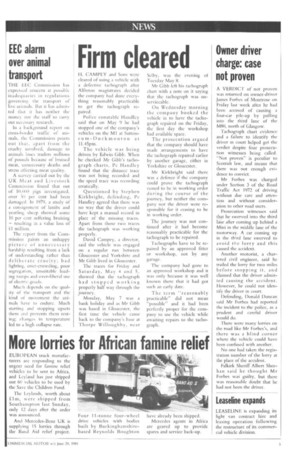Firm cleared
Page 7

If you've noticed an error in this article please click here to report it so we can fix it.
H. CAMPEY and Sons were cleared of using a vehicle with a defective tachograph after Alfreton magistrates decided the company had done everything reasonably practicable to get the tachograph repaired.
Police constable Handley said that on May 9 he had stopped one of the company's vehicles on the M1 at Suttoncum-Duck in onton at 11.45pm.
The vehicle was being driven by Edwin Gibb. When he checked Mr Gibbs tachograph charts, Pc Handley found that the distance trace was not being recorded and the speed trace was recording erratically.
Questioned by Stephen Kirkbright, defending, Pc Handley agreed that there was no way that the driver could have kept a manual record in place of the missing traces. Apart from those two traces the tachograph was working properly.
David C.ampey, a director, said the vehicle was engaged on a regular run between Gloucester and Yorkshire and Mr Gibh lived in Gloucester.
The traces for Friday and Saturday, May 4 and 5, showed that the tachograph had stopped working properly half way through the journey.
Monday, May 7 was a bank holiday and as Mr Gibb was based in Gloucester, the first time the vehicle came back to the company's base at Thorpe Willoughby, near Selby, was the evening of Tuesday May 8.
Mr Gibb left his tachograph chart with a note on it saying that the tachograph was unserviceable.
On Wednesday morning the company booked the vehicle in to have the tachograph repaired on the Friday, the first day the workshop had available space.
The prosecution argued that the company should have made arrangements to have the tachograph repaired earlier by another garage, either in Yorkshire or Gloucester.
Mr Kirkbright said there was a defence if the company could prove the tachograph ceased to be in working order during the course of the journey, but neither the company nor the driver were responsible For it ceasing to be in working order.
The journey was not continued after it had become reasonably practicable for the tachograph to be repaired.
Tachographs have to be repaired by an approved fitter or workshop, not by any garage.
The company had gone to an approved workshop and it was only because it was well known there that it had got such an early date.
The term "reasonably practicable" did riot mean "possible" and it had been perfectly proper for the company to use the vehicle while awaiting repairs to the tachograph.




































































































